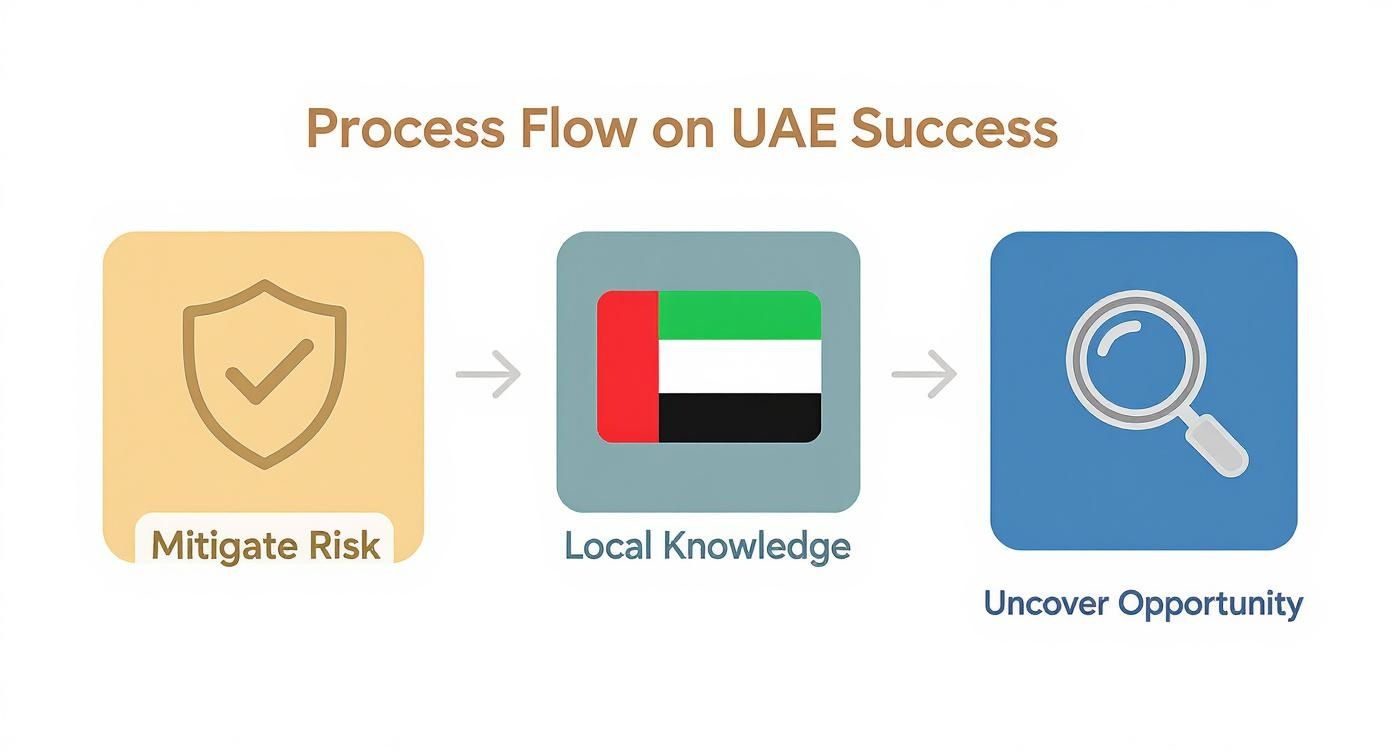Hiring Real Estate Consultants To Grow Your Portfolio
- Credence & Co
- Nov 16, 2025
- 14 min read
Think of a real estate consultant as a strategic advisor for your property ventures. They're not like real estate agents who are focused on the deal itself. Instead, their job is to provide expert, data-driven advice on development projects and investments, helping you maximize returns and minimize risks through deep market analysis and financial planning.
What Do Real Estate Consultants Actually Do?

It’s a common mix-up, but consultants and agents play very different roles. An agent is a dealmaker, working to buy, sell, or lease a property, usually for a commission. A consultant, on the other hand, is your strategic partner. They work on a fee basis, offering impartial advice to optimize your investment's entire lifecycle.
Here’s a simple analogy: an agent helps you pick a car from the showroom floor, focusing on that one transaction. A consultant is more like the automotive engineer who advises you on the best engine to build for long-term performance and efficiency. Their focus isn't the sale—it's the underlying success of the investment.
Beyond the Transactional Mindset
The core of a real estate consultant's job is to create the strategic blueprint for your property decisions. They don't just help you find an asset; they validate its potential. This requires a much deeper dive into analytics and future-casting than what a typical agent would ever provide.
Their advisory work covers a few critical areas:
Feasibility Studies: Before you spend a single dirham, a consultant will analyze market demand, project costs, and potential revenue to see if an idea is even viable.
Market Research: They deliver detailed insights on everything from demographic trends and economic shifts to what your competitors are doing.
Financial Modeling: They build out complex financial projections to forecast cash flow, calculate your potential return on investment (ROI), and flag any major risks.
Due Diligence: This is a big one. They meticulously check every detail of a potential deal—from legal paperwork to the physical state of the property—to protect you from nasty surprises.
A consultant’s value is measured not by the deals they close, but by the costly mistakes they help you avoid and the hidden opportunities they help you uncover. Their work is proactive, not reactive.
Architects of Investment Strategy
At the end of the day, hiring a real estate consultant is about building a long-term partnership. For a developer, they supply the hard data needed to secure financing and guide a project from a sketch on a napkin to a completed building. For an investor, they pinpoint undervalued properties and build portfolio strategies that match specific financial goals.
Even lenders rely on them. A consultant provides an impartial, third-party assessment that takes a lot of the risk out of a lending decision. This strategic oversight ensures every move is informed, calculated, and set up for the best possible long-term value. It’s what turns a simple property purchase into a carefully engineered investment.
What Does a Property Advisory Firm Actually Do?

Think of a real estate consultant as a project's strategic partner. They offer a whole suite of specialized services that go way beyond just giving advice, acting more like an expert team you bring on to make sure a project is viable, profitable, and sound from every possible angle. It all starts with deep market knowledge and meticulous data analysis.
Nearly every engagement kicks off with market research and feasibility studies. This is the critical first step before any serious money is spent. A consultant digs deep to validate the entire project concept, analyzing everything from demographic trends and economic forecasts to the nitty-gritty of local supply and demand. Their job is to answer one fundamental question: will this idea actually work in the real world?
For example, if you're planning a new luxury apartment building, they’ll get to work researching competitor occupancy rates, what the local rental market can truly bear, and whether your target audience has the income to support it. This isn't about guesswork; it's about providing a data-backed "go" or "no-go" signal that acts as the first line of defense against a bad investment.
Financial Modeling and Investment Analysis
Once the market research gives the green light, the focus pivots to the money. Financial modeling and investment analysis is where the consultant builds the rock-solid business case for the project. They create detailed financial projections that map out the entire lifecycle, from the first dollar spent on construction to the long-term revenue and operational costs.
This isn't just a simple spreadsheet. It’s a dynamic, complex model designed to stress-test the investment under various scenarios. By calculating key performance indicators like Internal Rate of Return (IRR) and Net Present Value (NPV), the consultant quantifies the project’s potential profitability. This detailed financial story is absolutely essential for convincing lenders to provide financing and for getting investors excited to come on board. A huge part of this is getting the valuation right, which you can explore further in our guide on the purpose and methods of property valuation.
Development and Asset Management
Beyond the number-crunching phase, many consultants step into a hands-on development management role. Here, they essentially become the owner's eyes and ears on the ground, coordinating the moving parts—architects, contractors, legal teams—to ensure the project stays on track and, crucially, on budget. Their oversight is what makes sure the original vision gets executed exactly as planned.
After the property is built and open for business, the consultant's role often shifts to strategic asset and portfolio management. The new goal? To squeeze every drop of performance out of the real estate holdings. They provide ongoing advice on the big decisions that enhance property value and boost investor returns.
This often includes:
Lease Optimization: Figuring out the best strategies to attract and retain high-value tenants to maximize rental income.
Capital Improvement Plans: Pinpointing which renovations or upgrades will deliver the biggest bang for your buck.
Disposition Strategy: Advising on the perfect time to sell an asset to cash in on favorable market conditions.
Just as they help clients optimize their assets, the best advisory firms are always looking to improve their own internal processes. Exploring strategies for optimizing offshore operations for consulting and management businesses is one way firms can enhance their own efficiency, which ultimately leads to better results for their clients.
To give you a clearer picture, here’s a quick breakdown of the core services a real estate consultant provides.
Core Services Offered by Real Estate Consultants
Service Area | Objective | Key Activities |
|---|---|---|
Market Research & Feasibility | To validate a project's viability and market potential. | Analyze demographics, supply/demand, competitor landscape, and economic indicators. |
Financial Modeling & Analysis | To quantify profitability and secure financing. | Develop pro-formas, calculate IRR/NPV, conduct sensitivity analysis, and prepare investor packages. |
Development Management | To oversee project execution from concept to completion. | Coordinate architects and contractors, manage budgets and timelines, and ensure quality control. |
Asset & Portfolio Management | To maximize the ongoing value and return of properties. | Advise on leasing strategies, capital improvements, and optimal hold/sell timing. |
Ultimately, by weaving these services together, a real estate consultant offers a complete strategic roadmap for success.
They don't just spot opportunities. They build the plan to capture them, manage the entire process, and work to optimize the long-term financial outcomes for everyone involved.
How Consultants Drive Success in the UAE Market
The UAE's real estate market is famous for its ambition and speed. It's an electrifying place to be, but it's also incredibly demanding. In this environment, a real estate consultant isn't just an advisor—they're your essential guide, helping you navigate a landscape that’s as full of complex challenges as it is with opportunity. Their real value is turning deep local knowledge into your strategic edge.
Success in fast-paced hubs like Dubai and Abu Dhabi requires a lot more than just capital. You need an intimate understanding of nuanced local regulations, unwritten rules of business, and the subtle shifts in what buyers want. A consultant bridges that gap, acting as your cultural and regulatory interpreter to make sure your project is perfectly aligned with local laws and market expectations right from day one.
This local expertise forms the foundation for one of their most critical roles: risk mitigation. Think of them as the strategic defense for your entire project.
Identifying and Neutralizing Threats
In a market that can react quickly to global economic tremors and sudden policy updates, a consultant's job is to see trouble coming and neutralize it before it ever hits your bottom line. They build a protective layer around the common pitfalls that can sink even the most solid-looking ventures.
These strategies typically cover:
Market Volatility: Using predictive analytics, they help you figure out the best moments to buy, hold, or sell, shielding your capital from unexpected slumps.
Regulatory Hurdles: They make certain every piece of paperwork and every project plan satisfies the stringent requirements of authorities like RERA and the DMT, preventing expensive delays.
Project Roadblocks: From supply chain snags to disputes with contractors, they anticipate operational headaches and create contingency plans to keep everything moving forward on time.
A consultant’s foresight gives investors the confidence to act decisively, knowing that potential risks have been spotted, measured, and strategically managed.
Uncovering Hidden Market Opportunities
Beyond just playing defense, a great real estate consultant is a master at finding value where no one else is looking. Their boots-on-the-ground presence and vast professional networks give them a first look at off-market deals and emerging trends well before they hit the mainstream. This is where true insight into the UAE and wider GCC markets for real estate consulting really makes a difference.
They might pinpoint an undervalued commercial building in a district earmarked for major infrastructure upgrades or see the early signs of gentrification in a quiet neighborhood. By connecting these seemingly random dots, they transform overlooked properties into high-return investments, giving you a serious competitive advantage.
The demand for this expertise is skyrocketing right alongside the market itself. The UAE’s consulting sector swelled by 15.2% last year, hitting a value of $1.1 billion. This growth is fueled by massive development projects and government programs like the Golden Visa, which has supercharged foreign investment. This incredible momentum shows just how vital expert guidance is in a market that's expected to nearly double in value by 2033. For a deeper dive into these numbers, you can read the full research on the Middle East consulting market.
Navigating a Typical Consulting Engagement
So, what does it actually look like to bring a real estate consultant on board? While no two projects are identical, the process isn’t a mystery. It follows a well-worn path designed to get from your big-picture idea to a clear, data-driven plan of action.
Think of it as a collaborative journey. It’s methodical, moving from broad exploration to very specific, concrete advice. The whole point is to take the guesswork out of your decisions, making sure every step is solid before you take the next one.
Initial Consultation and Needs Assessment
It all starts with a conversation—and a very deep one at that. This first meeting is less of a sales pitch and more of a diagnostic session. The consultant's job is to get to the heart of what you're trying to accomplish.
Are you a developer trying to figure out if a new condo project will fly? An investor looking to squeeze more value out of your current properties? Or maybe a lender trying to get comfortable with a complex financing deal? Be ready for direct questions about your goals, timeline, budget, and how much risk you're willing to take on. The goal here is to get a 360-degree view of your situation to make sure their expertise is the right fit.
Proposal and Scope of Work
After that initial deep dive, the consultant will come back with a detailed proposal. This document is your roadmap for the entire project, and it's absolutely critical for making sure everyone is on the same page. It’s far more than just a price tag; it’s a strategic game plan.
A solid proposal will spell everything out, including:
The Scope of Work: A very precise breakdown of what they’ll be doing, whether it's a full feasibility study or a targeted market analysis.
Key Deliverables: What you'll actually get in your hands at the end, like a comprehensive report or a detailed financial model.
Project Timeline: A clear schedule with major milestones and deadlines.
Fee Structure: A transparent breakdown of all the costs, with no surprises.
This document is what builds trust. It gets rid of any gray areas and ensures you both agree on what success looks like and how you'll get there together.
A well-defined scope of work acts as a project's North Star. It guides every decision and ensures that the final deliverables are not just comprehensive, but directly answer the client's most critical business questions.
Research, Analysis, and Strategy
Once the proposal gets the green light, the real heavy lifting begins. This is where real estate consultants earn their keep. They dive into the data, pulling market research, analyzing trends, and building sophisticated financial models to see how things could play out. They’re essentially stress-testing your assumptions to uncover risks and opportunities you might have missed.
The following infographic gives a good sense of how this process helps clients reduce risk and tap into local market knowledge, particularly in a dynamic market like the UAE.

As the infographic shows, success isn't just luck; it's the result of a structured, disciplined process. The engagement wraps up with the delivery of a clear, actionable strategy. You'll get concrete recommendations and a roadmap for what to do next, giving you the confidence to make your move.
Choosing the Right Real Estate Consultant

Picking the right real estate consultant is easily one of the most important calls you'll make for your project. This isn't just about hiring an expert; it's about bringing a strategic partner into the fold who will have a direct impact on your bottom line. The right consultant can be a force multiplier, while the wrong one can lead to costly delays and missed opportunities.
Think of it like hiring a chief engineer for a complex build. You wouldn't bring in a bridge specialist to design a skyscraper. It’s the same in real estate—specialization is everything. You need a partner whose deep expertise lines up perfectly with what you’re trying to achieve.
Evaluating Core Competencies and Specialization
The first step is to see past a firm’s general reputation and really dig into what they're truly good at. A consultant known for brilliant residential feasibility studies might not be the right choice for a massive commercial logistics hub.
Start by looking at their background in your specific sector. Here’s what to zero in on:
Industry Specialization: Do they live and breathe residential, commercial, industrial, hospitality, or mixed-use properties? Their portfolio should be heavily weighted toward your project type.
Proven Track Record: Ask to see their past projects. Don't just look for a long list of clients; look for work that mirrors the scale and complexity of what you're planning.
Authentic Case Studies: Go beyond glossy testimonials. Ask for detailed case studies that lay out the initial problem, the consultant's step-by-step process, and the concrete, measurable results they delivered.
The goal is to find a consultant whose experience isn't just relevant but directly applicable. Their past successes should give you a clear picture of how they'll help you win.
Key Questions to Ask During Interviews
Once you have a shortlist, the interview is your chance to see how they think and communicate. This is where you find out if your working styles will click or clash. As you prepare, it can be useful to borrow principles from other advisory fields; for instance, there's great expert financial guidance on choosing a consultant that applies here, too.
Come to the table with specific questions that get to the heart of their process:
What’s your analytical approach? Have them walk you through how they’d tackle a problem unique to your project.
How do you react to unexpected market shifts? Their answer will tell you a lot about their agility and risk management skills.
What’s your communication and reporting style like? You need a partner who provides clear, consistent updates in a way that works for you.
Can you provide a completely transparent breakdown of your fees? Make sure there are no hidden costs and that payments are tied to clear project milestones.
Boutique Firm vs. Large Consultancy: A Comparison
Finally, you need to decide what kind of firm is the best match for your project. The choice between a smaller, specialized boutique firm and a large, full-service consultancy is a big one. Neither is automatically better; it all comes down to what your specific project needs.
Choosing the right type of firm is a strategic decision. A boutique firm offers a laser-focused, high-touch approach, which can be invaluable for unique or specialized projects.
Factor | Boutique Consulting Firm | Large International Consultancy |
|---|---|---|
Focus | Deep expertise in a niche sector or geography. | Broad, multi-disciplinary services across global markets. |
Service | Highly personalized with direct access to senior partners. | Often structured with larger teams and multiple contact points. |
Flexibility | More agile and able to customize their approach quickly. | Standardized processes and methodologies. |
Cost | Can offer more competitive fees for specialized work. | Typically higher overheads and premium pricing structures. |
On the other hand, a large consultancy brings a massive toolkit of resources and a global perspective, which might be essential for a large-scale, complex development. For anyone in the UAE, understanding how different real estate consulting companies operate as your growth partner is crucial. A complex megaproject might need the extensive resources of an international firm, whereas a niche development could flourish under the dedicated attention of a boutique specialist.
Your Real Estate Consulting Questions, Answered
Thinking about bringing a real estate consultant on board? It’s natural to have questions. Getting a clear picture of what they do, how they charge, and when to involve them is the first step toward a successful partnership.
Let's clear up some of the most common questions we hear from developers, investors, and lenders.
What’s the Difference Between a Real Estate Consultant and an Agent?
This is a common point of confusion, but the distinction is critical. A real estate agent is a transaction specialist. Their job is to help you buy, sell, or lease a property, and they earn a commission when the deal closes. Their focus is on getting the transaction over the finish line.
A real estate consultant, on the other hand, provides strategic advice for a fee. You hire them for their brain, not just their network. They dig into market analysis, build financial models, and assess a project's viability to help you make smarter decisions and get the best possible return on your investment. Their advice is completely objective and geared toward your long-term success, not a single sale.
Here’s a simple way to think about it: An agent helps you run the race. A consultant helps you design the racetrack and build a winning car.
How Do Real Estate Consultants Structure Their Fees?
There's no one-size-fits-all answer here; the fee structure really depends on the scope and complexity of your project. The most important thing is transparency—you should have a crystal-clear understanding of the costs before any work starts.
Here are the models you'll typically see:
Hourly Rate: This works well for quick, specific advice or short-term engagements where the scope isn't fully defined yet.
Fixed Project Fee: A set price for a clearly defined task, like a complete feasibility study or a due diligence report. You know exactly what you're paying and what you're getting.
Monthly Retainer: Ideal for long-term projects or ongoing portfolio management where you need consistent access to their expertise.
Performance-Based Model: This one aligns everyone's interests. Part of their fee is tied to hitting specific project goals or financial targets.
It's crucial to agree on a fee structure and get a detailed list of deliverables in your contract. This ensures everyone is on the same page from day one.
When Is the Best Time to Hire a Real Estate Consultant?
The short answer? As early as possible.
Ideally, you should bring a consultant in right at the beginning, before you've made any major investment decisions. Getting them involved early allows them to perform proper due diligence, gauge market feasibility, and help you build a solid strategy from the ground up. It’s the best way to avoid costly mistakes down the road.
That said, it’s never too late to get expert advice. A consultant can add tremendous value at any stage—whether you need to get a struggling project back on track, fine-tune an existing portfolio, or plan the perfect exit strategy. If you're facing a complex real estate problem that needs a data-driven, impartial perspective, it’s the right time to call one.
Can a Consultant Help Me Secure Financing?
Absolutely. In fact, their work is often the key to unlocking project financing.
While consultants don't lend money themselves, they create the documents and analysis that lenders need to see. They're the ones who build the detailed financial models, draft the in-depth market studies, and prepare the solid feasibility reports that make up a loan application.
A credible, professionally prepared report from a respected consultancy makes a powerful business case. It shows lenders you’ve done your homework, which significantly boosts your chances of securing favorable financing by demonstrating the project's potential and managing their perceived risk.
At Credence & Co., we bring clarity and strategic insight to help you navigate the UAE's property market with confidence. Our RICS-qualified experts deliver technically robust valuations and advisory to de-risk your decisions and optimize outcomes. Discover how our expertise can support your next project by visiting us at https://www.cnco.ae.

Comments